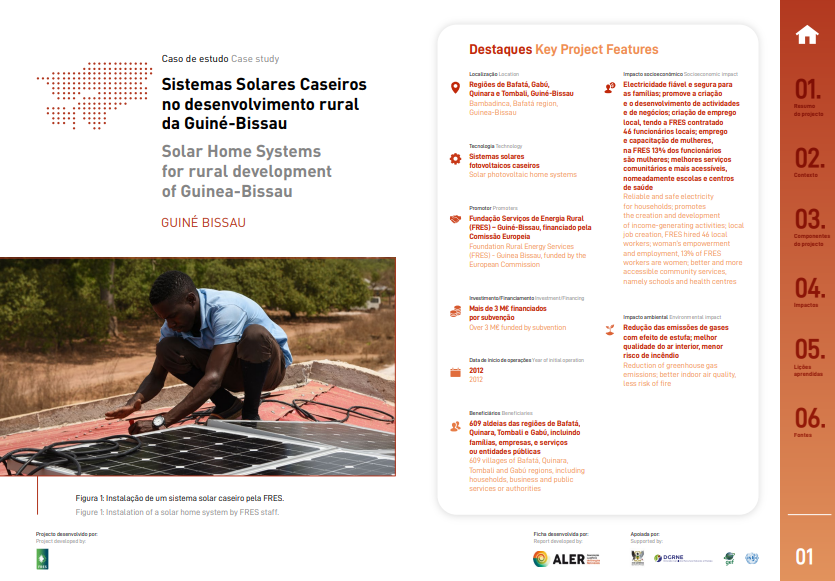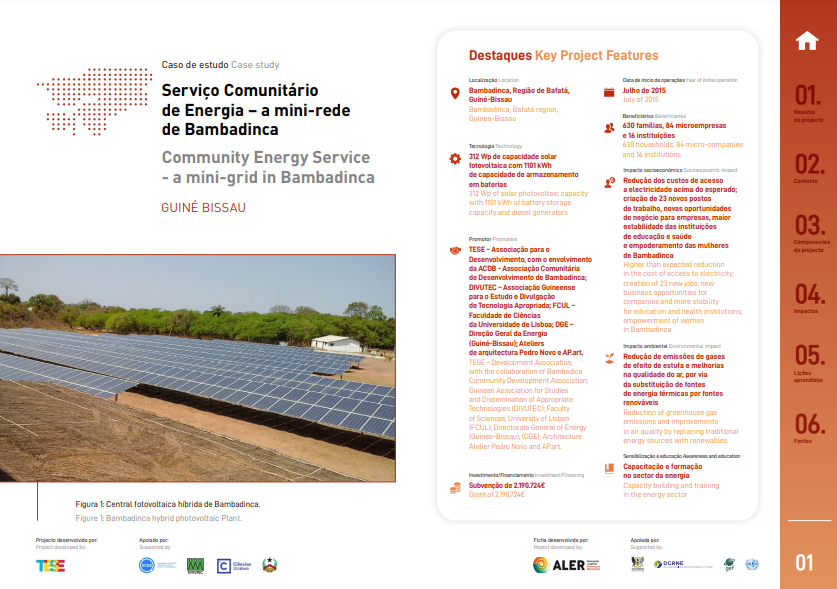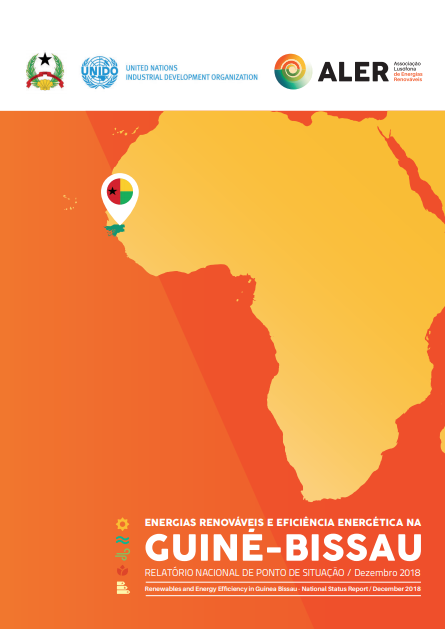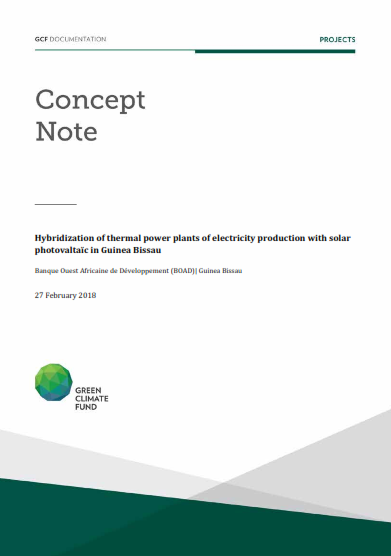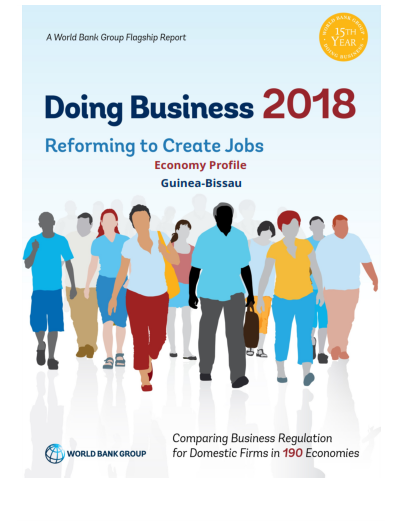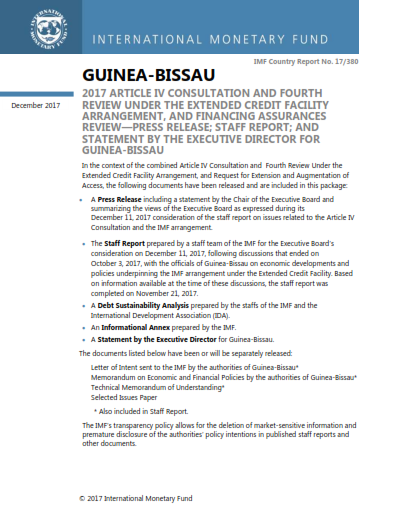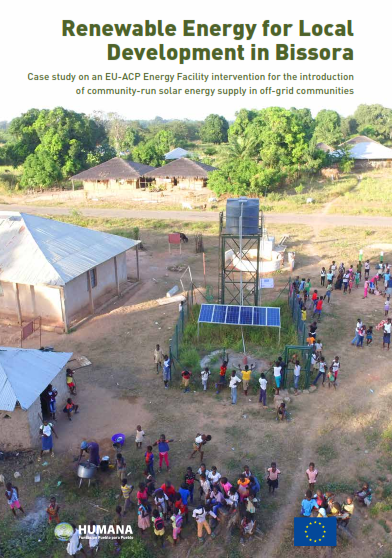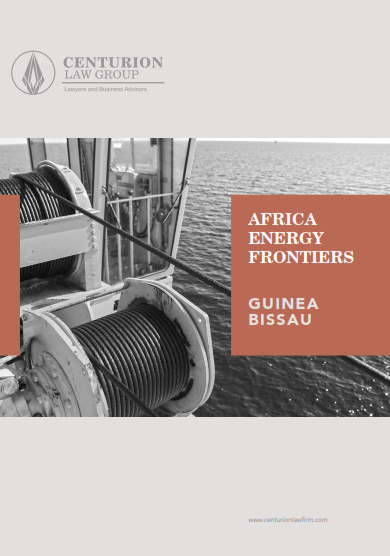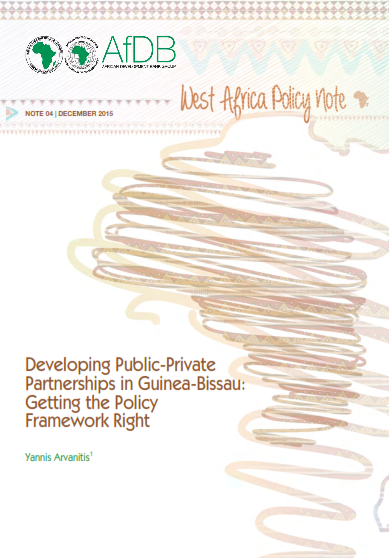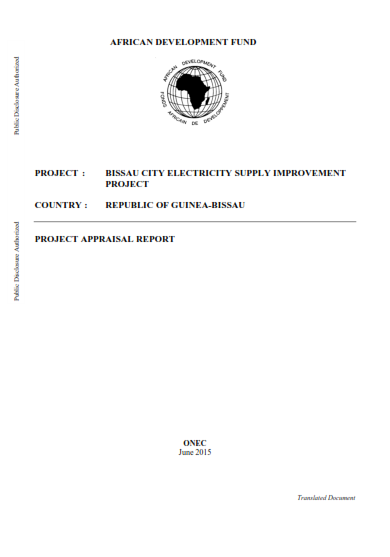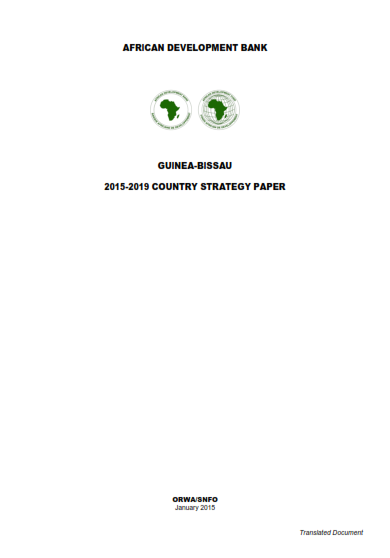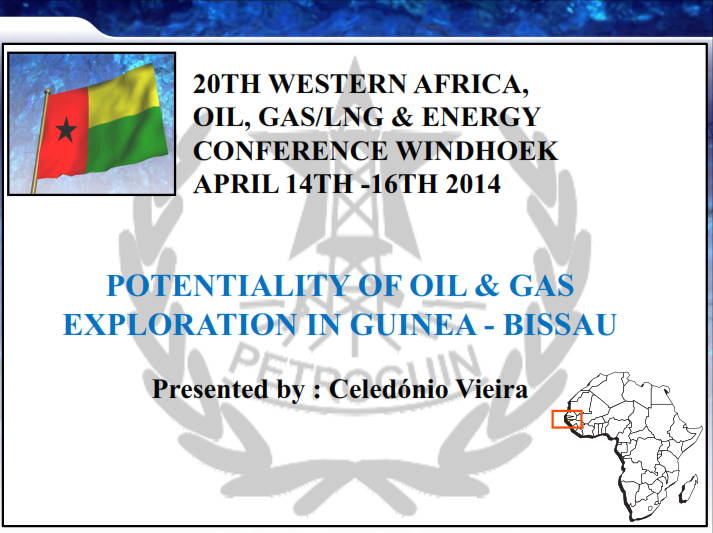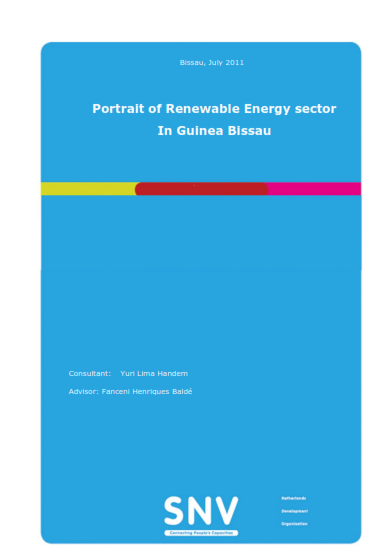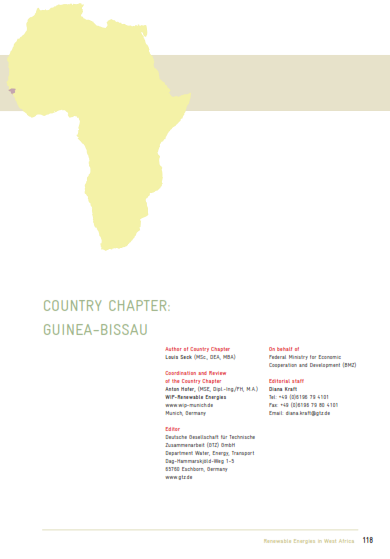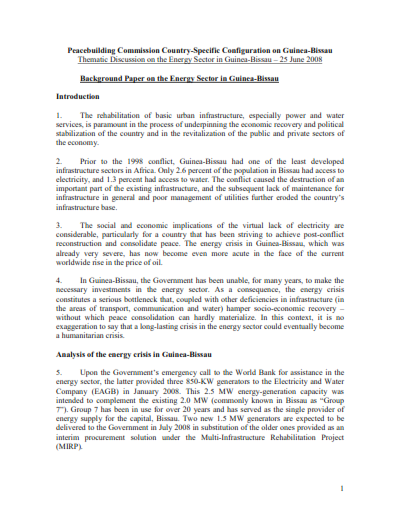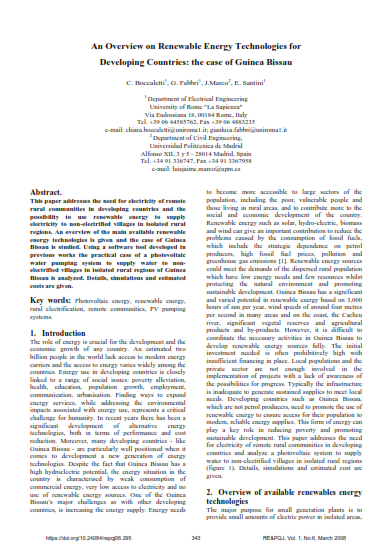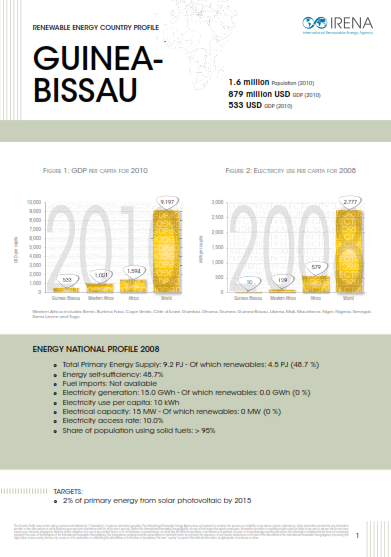We post here the relevant reports for the power sector in Guinea-Bissau. Feel free to join our efforts and share us any other you may have found. We'd be glad to add them to the list. Just send an email to This email address is being protected from spambots. You need JavaScript enabled to view it.
Publication date: 2022
Author: ALER
Description: This project works according to a pioneering Energy-as-a-Service model that has several advantages, such as the low initial investment cost and customers not having to pay for equipment management and maintenance. Through this implementation, was possible to implement greater access to electricity in rural areas, promoting better community services and reliable and safe energy for families in 609 villages in the regions of Bafatá, Quinara, Tombali and Gabú, but also for companies, services and public entities in the region, therefore promoting the creation of local employment and business opportunities.
Download Report >>
Visit Website >>
Publication date: 2022
Author: ALER
Description: The Bambadinca Community Renewable Energy Access Program - “Bambadinca Sta Claro” promoted the construction of a mini-grid in the village of Bambadinca, supplying electricity from a hybrid photovoltaic power plant.
This power plant has a peak power of 312 kWp, a battery bank of 1.1 MWh and diesel generators as backup. A threeparty management model was developed and implemented to ensure an efficient and sustainable operation of the mini-grid through a Public-Community Partnership between Bambadica Community Development Association and the Bafatá Regional Directorate of Energy.
Download Report >>
Publication date: 2018, December
Author: ALER / UNIDO
Description: Guinea Bissau has seen some progress in building its energy infrastructure. However, vast areas of Guinea Bissau remain literally in the dark. Rural electrification has reached dozens of communities through the expansion of mini-grids and the projected construction of the national grid.
Download Report >>
Publication date: 2018, February
Author: GCF
Description: The energy situation in Guinea Bissau is mainly characterized by a very disproportionate and insufficient access to energy services, depending on whether it is urban or rural, on the one hand, and on the other, by an institutional and regulatory framework non propice to the development of the electricity subsector.
Download Report >>
Publication date: 2018
Author: WB
Description: The Doing Business project provides objective measures of business regulations and their enforcement across 190 economies and selected cities at the subnational and regional level.
Download Report >>
Visit Website >>
Publication date: 2017, December
Author: IMF
Description: IMF Executive Board Completes Fourth Review Under the ECF Arrangement, Approves US$ 4.3 Million Disbursement, and Concludes 2017 Article IV Consultation with Guinea-Bissau.
Download Report >>
Visit Website >>
Publication date: 2017, February
Author: HUMANA
Description: This document was developed to contribute to establishing best practice in community-run renewable energy projects. Its purpose is to share the experiences and knowledge attained throughout the life of the project with other civil society organisations.
Download Report >>
Publication date: 2016, August
Author: CENTURION
Description: Guinea-Bissau is as much a frontier oil and gas country as it gets. With an exploration history dating back to the 1960s, discoveries remain elusive. However, new seismic studies and successes in neighboring regions should see the sector pick up pace, as the country recovers from a coup d’état that took place in 2012, and reaps the rewards of its attractive oil and gas contract terms.
Download Report >>
Publication date: 2015, December
Author: AfDB
Description: Public Private Partnerships refer to investment arrangements between private and public entities. Contrary to what may seem, PPPs do not have a legal meaning as they may take many forms.
Download Report >>
Publication date: 2015, June
Author: AfDB
Description: The Bissau City Power Supply Improvement Project (PASEB) is part of the electricity sector investment and capacity building programme consistent with Guinea-Bissau's Strategic and Operational Plan for 2015-2020.
Download Report >>
Publication date: 2015, January
Author: AfDB
Description: This new CSP is based on the Bank’s reflections on fragility and is the outcome of discussions with the newly elected Government, development partners and other stakeholders.
Download Report >>
Publication date: 2014, April
Author: Celedonio Vieira
Description: PRESENTATION OUTLINE:
- Location Map;
- Overview of the National Oil and Gas Sector;
- Petroleum Code – Law N°/82;
- Joint Venture Agreement Model- Overview of the Therms;
- Offshore Blocks Status;
- Guinea – Bissau Hydrocarbon Plays;
- Existing Seismic Multiclient Data;
- Petroguin/Geopartner Multiclient 3D Contract;
- Sinapa Oil Discovery Revaluation;
- Our Vision Realized.
Download Report >>
Publication date: 2011, July
Author: SNV
Description: SNV is starting a new area of focus in Guinea Bissau: Renewable Energies. The main objective of this paper is to provide SNV Guinea Bissau a portrait of the current status of Renewable Energies (RE) sector in Guinea Bissau, main actors and opportunities of intervention that can lead to a positioning of SNV in this sector.
Download Report >>
Publication date: 2010
Author: GTZ
Description: The Country Study of Guinea-Bissau is to provide an overview of the country’s energy market and to support decision-making for private investments for the Renewable Energy (RE) sector in Guinea-Bissau.
Download Report >>
Publication date: 2008, June
Author: NA
Description: In Guinea-Bissau, the Government has been unable, for many years, to make the necessary investments in the energy sector. As a consequence, the energy crisis constitutes a serious bottleneck that, coupled with other deficiencies in infrastructure (in the areas of transport, communication and water) hamper socio-economic recovery – without which peace consolidation can hardly materialize. In this context, it is no exaggeration to say that a long-lasting crisis in the energy sector could eventually become a humanitarian crisis.
Download Report >>
Publication date: 2008, March
Author: UR / UPM
Description: This paper addresses the need for electricity of remote rural communities in developing countries and the possibility to use renewable energy to supply electricity to non-electrified villages in isolated rural regions. An overview of the main available renewable energy technologies is given and the case of Guinea Bissau is studied. Using a software tool developed in previous works the practical case of a photovoltaic water pumping system to supply water to nonelectrified villages in isolated rural regions of Guinea Bissau is analyzed. Details, simulations and estimated costs are given.
Download Report >>
Publication date: 2008
Author: IRENA
Description: Renewable Energy Country Profile Guinea-Bissau.
Download Report >>





